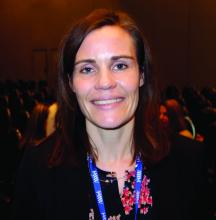ATLANTA – With the help of a pharmacist and the electronic health records system, Rochester (N.Y.) General Hospital ruled out penicillin allergies in 47 of 50 adult inpatients, and successfully transitioned them from second-line antibiotics to less expensive and more effective beta-lactam options.
The hospital’s EHR system generated a daily list of patients with a history of penicillin allergy who were on second-line options – vancomycin, daptomycin, aztreonam, linezolid, or moxifloxacin – for infections that would be better treated with beta-lactam antibiotics. An infectious disease pharmacist reviewed their history; if reported penicillin reactions were limited to a nonspecific rash more than 5 years earlier or seemed to be IgE mediated, patients were skin-prick tested to see if they really were allergic. Almost all of the 47 patients who had negative tests were switched to either a penicillin-based regimen or a cephalosporin.
Two weeks after discharge on phone follow-up, just one reported a problem: a mild rash that cleared up when he finished his course.
Lead investigator Allison C. Ramsey, MD, an allergist at Rochester General, estimates the switch saved $780 per patient and close to $40,000 overall, much of it by avoiding the expense and time of infusing vancomycin, the antibiotic most of the patients were on before being switched. It also saved 23 hospital days; patients transitioned to oral antibiotics didn’t need to stick around to get an IV catheter placed and have home services arranged.“We are not a major academic center, and have to prioritize what resources we have,” said Dr. Ramsey, who did most of the skin-prick tests. Triaging patients for testing based on antibiotic use is “a good way to start. We are getting this off the ground at our institution. I think it’s a good model for non-academic community hospitals,” like Rochester General, a 528-bed tertiary care center.
It’s no secret that penicillin allergies are extremely overdiagnosed, and that 90% or more of patients who carry the label – both inside and outside of hospitals – really aren’t allergic. Even so, patients are rarely tested to confirm the allergy, and instead end up on expensive second-line options that don’t work as well. They “wind up back in the hospital in a month,” Dr. Ramsey said.
The problem was a frequent topic of discussion at the American Academy of Allergy, Asthma and Immunology annual meeting, where she reported her findings. The Rochester General approach was of great interest to her audience, judging from the number of people who asked for more details after the presentation.
Most of the subjects were on the internal medicine service; the rest were surgery patients. Skin/soft tissue, bloodstream, respiratory, and intra-abdominal infections were the most common.
The investigators excluded patients with a history of severe allergic reactions, such as joint swelling or skin sloughing, as well as patients with a flat, itchy, non-urticarial rash after penicillin less than 5 years earlier. ICU patients were excluded due to consent issues.
Also for safety, the team did a one-time amoxicillin oral challenge before patients were switched to a cephalosporin.
An audience member said he’d heard of pushback on such efforts because patients are being moved to less expensive antibiotics, so hospitals won’t be able to bill as much.
Dr. Ramsey replied that Rochester General has been “extremely supportive of our efforts, because we have a good case for improving clinical outcomes with this program.” Meanwhile, the two infectious disease pharmacists at the hospital “have embraced this fully. It makes their job easier down the road because most of these patients are frequent fliers.”
Dr. Ramsey had no relevant financial disclosures.


